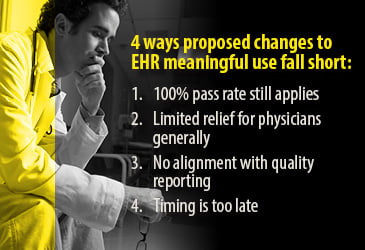 Recent changes proposed for the electronic health record (EHR) meaningful use program are important ones, physicians are telling the Centers for Medicare & Medicaid Services (CMS), but they don’t get at the heart of the problem.
Recent changes proposed for the electronic health record (EHR) meaningful use program are important ones, physicians are telling the Centers for Medicare & Medicaid Services (CMS), but they don’t get at the heart of the problem.
CMS and the Office of the National Coordinator for Health IT (ONC) have released a proposed rule that would allow physicians to use their currently installed Version 2011 certified EHR software to meet this year’s requirements if their vendors are unable to get their practice upgraded to Version 2014 software in time.
In addition, physicians who were scheduled to move to Stage 2 would be allowed to stay at Stage 1 for another year using either Version 2011 or Version 2014 EHR software. Physicians who are in the process of upgrading but have not fully implemented their EHR software to Version 2014 also may participate in another year of Stage 1 measures.
While the proposal is a step in the right direction, it doesn’t go far enough to provide the relief physicians need in this burdensome program.
“[T]he rule fails to acknowledge the chief problem with the program’s design—the ‘all-or-nothing’ approach used to evaluate participants,” the AMA said last week in a comment letter.
The association repeated its call for CMS to replace the existing pass-fail approach with a 75 percent pass rate for physicians to qualify as having met the program requirements. The AMA also pressed CMS to allow physicians who meet at least 50 percent of the meaningful use requirements to avoid a financial penalty.
“[W]e have serious concerns that, unless the meaningful use program is modified, the majority of physicians will not move to Stage 2 of the program and will never reach Stage 3,” the letter said. To date, one-half of physicians have yet to meet Stage 1 requirements, and only 1 percent of physicians have attested to Stage 2 so far this year.
The AMA also pointed to three other significant shortcomings of the proposed rule:
- The revisions are aimed generally at early adopters of EHRs and larger groups and hospitals, leaving other physicians with little relief.
- The proposal does not address much-needed quality alignment between the meaningful use program and the Physician Quality Reporting System, so physicians still have to report twice to avoid monetary penalties.
- The timing of the proposed rule, which would not take effect until September, likely will be too late to offer significant help for most physicians.
In particular, the AMA pointed to the fact that the deadline to file for a hardship exemption was July 1, and the proposed rule caused some confusion about how it might apply to different physicians. The letter urges CMS to extend the hardship deadline until 30 days after the final rule is published so physicians have time to understand the revised program requirements and apply for a hardship exemption if needed.




